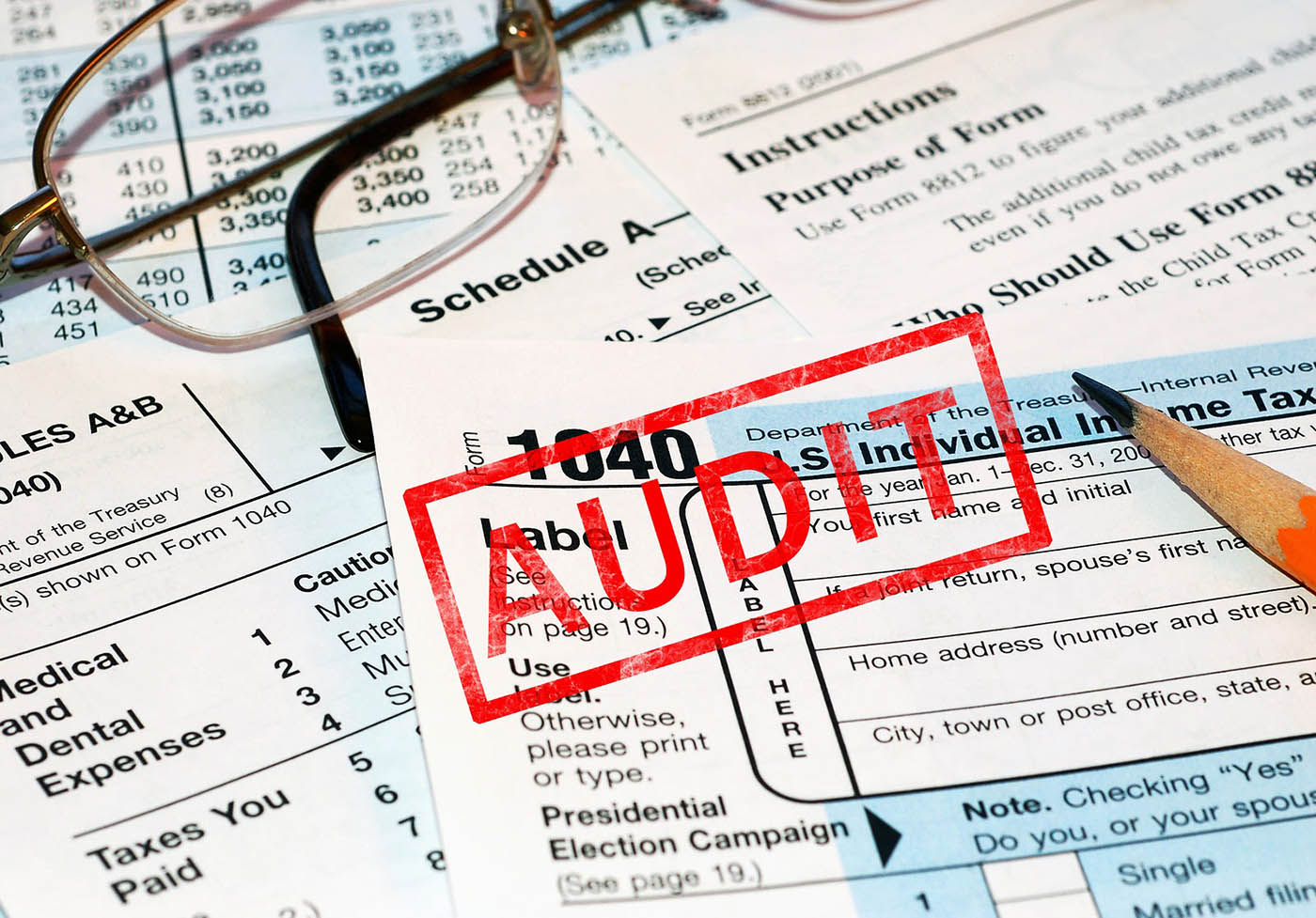How to Avoid a Tax Audit
Learn how to avoid a tax audit in California cities like Sacramento & Roseville. Avoid the stress of a tax audit in California with these tips from the Cook CPA Group. Call us for a free consultation about your accounts.
The IRS could be classified as one of the most powerful organizations in the United States. The IRS is solely responsible for collecting federal taxes, enforcing federal tax laws, and imposing penalties for late, understated, or evasive filings. Therefore, the IRS poses one of the largest financial threats to many individuals and business owners. To sum it up, the IRS has unique informational resources, legal standing, and roles as a law enforcement agency. On top of that, the IRS also acts as a legislative-originating authority with a large amount of freedom to make mistakes without consequences (no one can penalize the IRS for incorrect tax accusations).
So what can we do to minimize the IRSs over-inflated accumulation of power and protect ourselves from its potential for financial wrath? While every tax situation and scenario is unique, there are certain practices a taxpayer can implement to reduce the likelihood of facing a tax audit or another enforcement action. To discuss your tax audit risk with a Roseville tax professional from the Cook CPA Group, please call 916-724-1665 or contact us online. For more information on how to minimize the risk of a tax audit, please continue reading.
Avoiding Tax Errors and Mistakes Starts with Hiring an Accountant
I know what you are thinking as you read this – “Why do I need to pay an accountant when I can buy a tax software program for $49?” For starters, an accountant can help you get organized. He can advise you on the best way to keep records. An accountant can help you prepare profit-and-loss statements so that you can see how much money you are making and where your money is going, and help anticipate how much tax you may owe. He can advise you as to what is (or is not) deductible for tax purposes, as well as the best way to substantiate and increase your legitimate deductible expenditures. Most importantly, an accountant can keep you in tax filing compliance. Believe it or not, one of the most common reasons why people attract IRS scrutiny is because they failed to satisfy routine filing requirements.

Maintain Legally Sufficient and Accurate Tax Records
Without good records, you have no means to justify your legitimate deductions under the tax laws. Remember: in an audit, the burden of proof is on you to substantiate your legitimate tax deductions. Keep a daily calendar of your activities and receipts for all your business expenses, organized monthly. I know this sounds like it’s more trouble than it’s worth. Let me assure you that if you follow my advice it will be well worth the effort for two reasons:
First, it will make it that much easier for your tax preparer to go through your records.
More importantly, it will allow you to defend yourself should the IRS come knocking on your door. I have seen, with my own two eyes, what happens in audit situations where clients’ records are sparse or non-existent. It isn’t a pretty sight.
If You Receive a Letter from the IRS, Seek Guidance Immediately
Upon receiving a letter from the IRS, run (do not walk) to a tax professional. IRS letters run the gamut from the fairly benign inquiry regarding a simple mistake or correction to a serious problem. (As a quick rule of thumb, a certified letter usually indicates a serious problem.) For example, it’s common for the IRS to lose a tax return or a payment. If you can quickly satisfy the IRS by sending them a copy, why not take care of it right away, before it becomes serious?
Another possible reason for IRS correspondence may be that the IRS has some questions regarding a tax return you filed. Let me assure you from experience that ignoring this type of letter will not make the problem go away. Instead, the IRS will proceed without you, which could eventually require you to hire someone like me to fight the government in court or in IRS collections.
If Tax Minimization Advice Sounds Too Good to Be True, It Probably Is
Many clients ask me about putting their money in unincorporated business organizations, offshore accounts and trusts, or in gold bullion in the cellar. These schemes and strategies are all premised on the idea that he or she won’t have to pay taxes. When you hear something like this, there is a good chance the IRS already knows about this type of tax dodge. My advice is to seek a reputable third-party opinion. I know this will cost some money, but it could save you thousands of dollars in aggravation later. Generally, arranging “paper transactions” to avoid taxes is a slippery slope to serious tax problems.
Avoid Missing Tax Filing Deadlines
The easiest way to get into trouble with the IRS is not to file your tax returns on time. Very few people who voluntarily file their tax returns get audited. On the other hand, my experience is that people who only file the tax returns after the IRS inquiry are more likely to be scrutinized. I cannot think of a single good reason to make yourself visible to IRS radar.
Do Not Make-up Numbers or “Ballpark It” when Filing Income Tax Returns and other Documents
People tend to panic at tax time when they discover that a huge tax bill awaits. It is very tempting to start making up numbers. Resist this temptation. While it is never pleasant to owe the IRS money, submitting an obviously false return could land you in jail. Even in the least worst-case scenario, additional penalties and interest on the unpaid tax obligation will maker this a costly mistake. A corollary is that you should also resist the temptation to make up false receipts for the IRS to look at if you are audited. Taxpayers who attempt to use fraudulent documents to justify claimed deductions, expenses, and income can quickly find themselves facing criminal tax charges. Don’t be the taxpayer whose short-sighted attempts to save $12,000 in taxes, ends up resulting in $25,000 or more in legal fees!

Basic Steps to Getting Control of Taxes and Reducing One’s Tax Liability
Everyone’s tax situation is unique, but here are a few basic steps that can help you gain control of your tax and financial situation.
First, keep good records of all business expenses and be sure to substantiate any claimed business purpose. Nine out of ten tax problems arise from the failure to take this simple, if occasionally tedious, precaution. The tax law specifically allows you to deduct necessary and ordinary business expenses incurred in carrying on a trade or business. Keep a daily record, diary, or planner with all your business expenses.
One practice that can help you manage the above is to use one, or at most two, credit cards exclusively for all your business purposes. This way, you know exactly where to look for all the business expenditures.
Additional tax saving opportunities for your business or household may include:
- Do you travel overnight as part of your business? Of course, you do. Do your clothes get dirty as a result? Then the cost of dry-cleaning them is entirely tax deductible.
- Keep track of bank deposits so that all items will be easy to trace. Write the source of the check directly on the deposit slip, especially transfers between accounts, so that these are not inadvertently counted as income. The first thing tax auditors request are your checking, savings, and investment accounts. They then proceed to do a total cash receipts analysis, comparing the total to the gross income shown on your tax return. By marking every deposit slip, you know where to look for further documentation to support your notation and the auditor will have the trail in front of him or her for the source of the unusual nontaxable receipts such as insurance recoveries, loans, gifts, and inheritances. Surprisingly, it’s not that much work and is worth the effort.
- Always keep your checking and savings accounts free of irregularities. Be sure you can explain large bank deposits and increases (especially sudden ones) in your net worth. WARNING: If you have unreported income of more than 25% of your adjusted gross income, the auditor may turn your case over to the CID. If you suspect this may occur, do not provide any leads to the auditor regarding the sources of the unexplained deposits. The burden of proof is on the IRS. You do not have to provide leads that make their job easier.
- Does your spouse work? If not. You should consider hiring her or him at minimum wage to formalize the work that he or she probably already performs for your business. Document it, but be sure that what you say is accurate. Then, set up an insured medical reimbursement plan for your employees (i.e., your spouse) and dependents (your kids), and deduct your contributions as a business expense. However, please do note that if the plan is not funded by insurance, then other IRS rules apply. Consult with an experienced accountant to avoid easy to make mistakes regarding taxes and health benefit plans.
- Do you have children? Are they older than six or seven years old? Then put them to work! By which I mean, you should consider hiring them for minimum wage (perfectly legal in a family business). Their first $5,150 or so will be basically tax-free to the child because of the standard personal tax deduction – and totally deductible to you! One more important note here: make sure that your child is actually performing legitimate, business-related work you can document, if asked. Yes, stuffing envelopes does count provided that it is legitimately part of your business activities.
- Do you have more than one car? Then try to use one solely for business purposes. This will take some self-discipline, but it will allow you get the most tax benefit from one business vehicle. We can discuss some products and practices that can help you keep track of business vehicle usage.
- If possible, conduct sales seminars and presentations at home. In this way, the cost of all food and refreshments (even the leftovers!) will be totally tax deductible as a business expense. Of course, you need to prove, if asked, that this was not just a social bash! I suggest videotaping all or part of the evening for posterity, or collecting people’s business cards and filing them with your receipts.
Sound tax planning lets you keep more of your money. However, tax planning is not complete without careful planning for a potential audit. Protect yourself from a worst-case audit scenario by keeping evidence of your legitimate tax write-offs and business expenses.
Hire a Sacramento Tax Professional to Protect Against Audit Risk
Quite possibly, our best defense against audits and false evasion accusations is to keep accurate, detailed records of cash flow, payments, earnings and other financial motions. Depending on your profession and your position within it, your specific approach could be extensive and time-consuming.
A meeting with your financial advisor or accountant is a great place to start to find advice on what financial records and statements are the best to focus on to keep up your guard. Generally speaking, the greater volume of records you keep (and their accuracy), the better your chances are for surviving an all-out IRS battle.
To arrange for an assessment of your tax records and tax practices, please call the tax professionals of the Cook CPA Group at 916-432-2218. We offer free initial consultations.

